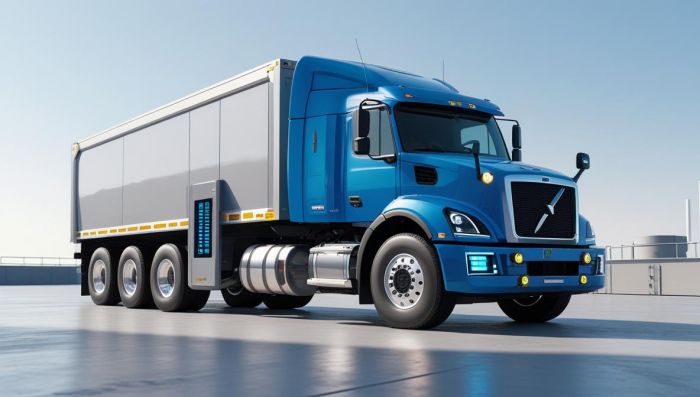Onboard weighing systems are changing fast, making it easier for vehicles to check and manage their loads. These clever devices let trucks and other big vehicles measure how much they're carrying while moving or standing still. In the next five years, we'll see big improvements in this technology that will change how transportation and shipping work. Let's look at the cool new things coming for these important tools and how they'll affect different industries.
| Trend | Impact |
| IoT Integration | Real-time data sharing, improved logistics planning |
| AI Implementation | Predictive analytics, route optimization, accident prevention |
| Wireless and Cloud Technology | Easier installation, remote access, enhanced fleet management |
| Customization | Industry-specific solutions, improved efficiency across sectors |
| Energy Efficiency | Reduced fuel consumption, lower environmental impact |

An onboard weighing system is like a special scale built into a vehicle. It can weigh what the vehicle is carrying while it's moving or stopped. This helps drivers know if their truck is too heavy or too light. These systems use special sensors on the vehicle's suspension or body to measure how the weight is spread out and how much there is in total.
These systems are really useful in many jobs. Truck drivers use them to make sure they're not carrying too much weight and breaking rules. Farmers use them to weigh crops as they harvest. Even garbage trucks use them to keep track of how much trash they're picking up. They're also used in mining, construction, and shipping, where knowing exact weights is really important for safety and doing a good job.
Soon, onboard weighing systems will start talking to other smart devices. This is called the Internet of Things or IoT. Imagine a truck that can tell the warehouse how much it's carrying before it even gets there. This will help companies plan better and save time. These connected systems will let managers see how much all their trucks are carrying at once. They'll also be able to talk to other smart things on the road, like weigh stations, making it easier to move goods around and reduce traffic jams.
Artificial Intelligence, or AI, will make these systems much smarter. They'll be able to guess when a truck might be too heavy before it happens. This could stop accidents and save money on fines. AI could also help plan the best routes for trucks based on their weight and the roads they need to take. These smart systems will learn from past information to spot patterns and help keep the weighing systems and vehicles in good shape. They'll also adjust to different roads and driving conditions, giving more accurate weight measurements in all sorts of situations.
Soon, most onboard weighing systems won't need wires. This will make them easier to put in and fix. They'll also start using the cloud, which means the weight information can be stored and checked from anywhere. This will be great for companies that need to keep track of lots of vehicles at once. These cloud systems will work well with other business software, making everything run smoother. Being wireless also means they can be updated and checked from far away, which saves time and money on fixes.
Easy Installation
Wireless systems are simpler to install, reducing setup time and costs
Remote Access
Cloud storage allows weight information to be accessed from anywhere
Fleet Management
Ideal for tracking multiple vehicles simultaneously in real-time
Every job is different, and future weighing systems will be made to fit specific needs. A system for a mining truck will be different from one for a delivery van. The onboard weighing system from Griffith Elder, for example, can be adjusted to work well in various industries like farming, construction, and waste management. These special systems will think about things like what kind of vehicle it is, what it's carrying, and where it's working to give the most accurate weight information. For example, farm systems might check how wet the crops are, while systems for chemical trucks might have extra safety features for dangerous materials.
New onboard weighing systems will use less power and help vehicles save fuel. By knowing exactly how much weight a vehicle is carrying, companies can plan trips better and use less fuel. This is good for both saving money and helping the environment. Some of these systems might even make their own power from the vehicle moving or from the sun. Using less fuel and knowing exact weights will also mean roads and vehicles don't wear out as fast, so they won't need to be fixed or replaced as often. These systems will also help electric and hybrid vehicles work better by giving exact weight information to help figure out how far they can go on a charge.
Energy Efficiency
New systems will use less power, reducing overall energy consumption
Fuel Savings
Accurate weight data enables better trip planning and reduced fuel usage
Environmental Impact
Lower fuel consumption leads to reduced emissions and environmental benefits
Optimized Logistics
Efficient vehicle use and route planning contribute to sustainability efforts
These new trends in onboard weighing systems are important for many reasons:
The next five years will bring exciting changes to onboard weighing systems. They'll become smarter, more connected, and better at helping different types of businesses. Whether you drive trucks, manage a fleet, or work in an industry that relies on accurate weight measurements, these changes will make your job easier and more efficient.
As we look to the future, it's clear that onboard weighing systems will play a big role in making transportation and logistics smarter and more eco-friendly. These new technologies might change how we think about moving and weighing things on the road, leading to a better, safer, and cleaner way of transporting goods.
Be the first to post comment!